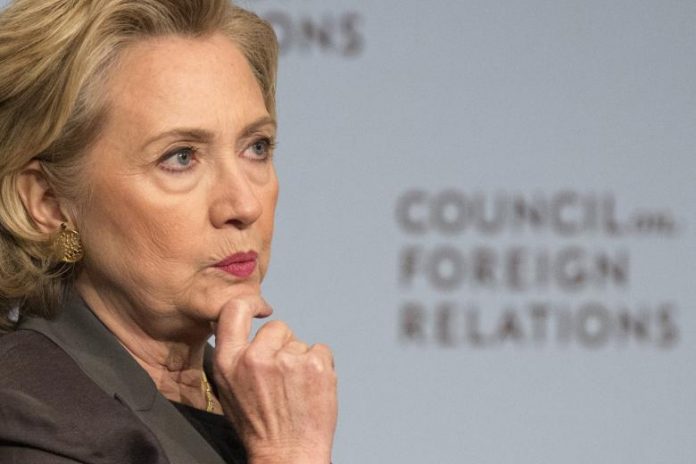Why Did Hillary Clinton Lose To Donald Trump? It was Hillary Clinton’s “blue wall” – three Great Lakes battlegrounds that Republicans had banged their heads against for years.
But Donald Trump stormed the blue wall Tuesday, parlaying victories in Wisconsin, Michigan and Pennsylvania into the presidency.
Trump did it on a tide of votes from rural and blue-collar whites.
But he was helped by Clinton’s neglect of the region and her failure to fully mobilize her party’s own base, including young voters and African-Americans.
“Donald Trump brought a new calculation, a new way of winning (these states), but part of that was her colossal failure,” said GOP pollster Gene Ulm. “She did not turn out and galvanize the Obama coalition.”
In Wisconsin, where Clinton didn’t make a single stop during the general election campaign, she won voters under 30 by just 4 points. Obama won them by 23 points four years ago. The state voted Republican for the first time since 1984.
“The vote among younger voters dropped off appreciably” for Clinton, said Tom Holbrook, political scientist for the University of Wisconsin-Milwaukee.
Clinton’s margin in the ultra-blue city of Milwaukee was 27,000 votes smaller than Obama’s. That was roughly the size of her statewide defeat.
While Clinton may not have put a ton of resources into Wisconsin, her campaign peppered Michigan with visits by her and her surrogates during the final weeks.
Still, in Detroit, she won roughly 50,000 fewer votes than Obama did in 2012.
“It’s is nothing short of malpractice that her campaign didn’t look at the electoral college and put substantial resources in states like Michigan and Wisconsin,” says Democratic pollster Paul Maslin. Neither President Barack Obama nor the first lady was dispatched to Wisconsin, either.
Wisconsin, Michigan and Pennsylvania were each decided by about one percentage point.
In Wisconsin, Trump got roughly the same number of votes — 1.4 million — that Romney got while losing the state in 2012. The key was that Clinton got almost a quarter-million fewer votes than Obama, paving the way for Trump victory in a race where turnout lagged behind the previous four presidential races in the state.
In Michigan, Trump outperformed Romney, a native Michigander, in blue-collar Macomb County, known as the home of the Reagan Democrat. He outpaced Clinton in other regions of the state, vowing to secure America’s borders and return Michigan to its manufacturing heyday. Her share of the vote in Wayne County, home to Detroit, was 6 percentage points lower than Obama’s. Michigan went Republican for the first time since 1988.
In Pennsylvania, exit polls measured the African-American vote at 13% of the electorate in 2012, but 10% in 2016. Again, Clinton did not turn out her base of support in the volume needed to hold back Trump.
Maslin says blue-collar and middle-class whites in northern states have been a “swinging gate” in U.S. elections, shifting back and forth between the parties.
“The gate swung all the way open and Donald Trump walked right through,” said the Democratic pollster, who said the party had failed to connect with these voters’ economic concerns. “It could be a big time, long-term problem that Donald Trump may have exploited and Hillary Clinton may have been ill-equipped to prevent, but now we’re left with it.”
‘Not a politician’
In Michigan, part of the drop in voter turnout in Democratic and predominantly African-American Detroit was the function of population shift. Detroit’s financial troubles — it went through the largest municipal bankruptcy in U.S. history a few years ago — have been well documented and it’s been losing population for decades. Where some 925,000 people lived in Detroit in the early 2000s, that number is down to about 680,000 now, according to Census estimates.
But some residents said they also sensed apathy, even distaste, for Clinton’s campaign.
“From what I saw, a lot of African Americans did not go out to vote,” said Wilfred Blackmon, 70, president of a residents group of 3,000 homes on Detroit’s blue-collar northwest side. Blackmon, a Clinton supporter, said he’d voted in every election since he was 18. Yet, a few weeks ago, Blackmon heard Nation of Islam leader Louis Farrakhan on the radio.
Farrakhan “was disenchanted with Hillary. He went back to the days of Bill Clinton and the increased incarceration of black people,” Blackmon said, adding: “A lot of people listen to him.”
Jocelyn Harris, a Democratic Party precinct delegate on Detroit’s lower east side, said she and all of her family members turned out to vote for Clinton.
But Harris said she and others in her area of 2,600 homes — the Jefferson-Chalmers district — suffered two basement backups of sewage-tainted storm water over the summer. Dealing with those problems preoccupied her and countless neighbors, So Harris and other party regulars didn’t go door-to-door to get out the vote this fall as they had four years ago, she said.
“We didn’t get really get engaged this time,” Harris said.
There was some pushback Wednesday to the idea that Detroit — and specifically African-Americans — somehow let Clinton down.
“Black voters did what they always do. They turn out for the Democratic Party,” said Jonathan Kinloch, the Democratic Party’s chair of the 13th Congressional District, comprised of Detroit’s west and southwest sides, as well as 10 blue-collar suburbs.
Kinloch said the larger issue was elsewhere, that what happened was about “the conversation that the Clinton campaign needed to have with the souls of white America,” and with white voters’ “counter-response to the first African-American president.”
Jon Zurinsky, 34, of Sterling Heights in Macomb County, said he voted for Trump “because he’s not Hillary. I don’t like her.”
Zurinsky, who said he voted for President Obama once in the past, said Hillary Clinton sends “everything across seas” and “hopefully Trump will try to bring everything back,” particularly jobs.
“He’s not a politician,” Zurinsky said of Trump.
Rural anger
Trump won “non-college” whites in Wisconsin by 28 points — a group Romney carried by just 8 in 2012. He won rural voters by 29 points in a state where they constitute a major swing vote.
“Wow,” said political scientist Kathy Cramer, who studies rural communities, when she heard that number. No GOP nominee had won the rural vote in Wisconsin by more than 10 points in recent decades. Democrat Obama won them by 8 in 2008.
But Trump carried 59 of the state’s 72 counties, including some in western Wisconsin that hadn’t voted Republican for president since the 1970s or 1980s.
“Trump was an appealing candidate for people who were feeling like rural Wisconsin always gets a raw deal, and people in rural Wisconsin don’t get their fair share, and people in cities don’t respect them and nobody listens to them or has a clue what is going on there,” said Cramer, a University of Wisconsin-Madison professor and author of a book about politics and rural Wisconsin.
Trump performed worse than Romney in the prosperous, conservative suburbs of Milwaukee, the traditional heart of GOP power in Wisconsin.
But he did far better in northern and western Wisconsin and the battleground region of Green Bay.
His supporters were far more pessimistic than Clinton’s about the future and far less rosy about the economy. While 23% of Clinton voters in Wisconsin said life will be worse for the next generation, 59% of Trump voters said so.
“It was all about changing the status quo,” said Jerry Bader, host of a conservative Green Bay radio show, and a Trump critic who took flak all fall from pro-Trump listeners.
“What has historically been a liberal populist message resonated with these conservative voters: ‘You’re getting screwed by the system and I’m going to fix it,’” Bader said.
Exit polls in Wisconsin showed that 63% of voters had a negative opinion of Trump, but 21% of those who viewed him unfavorably still voted for him. That was a testament to two things: their desire to shake things up and their distaste for Clinton.
“It was: ‘We know his temperament. We know all of that. None of that mattered. He’s different,” said Bader.















